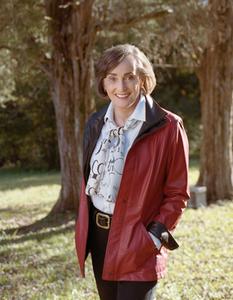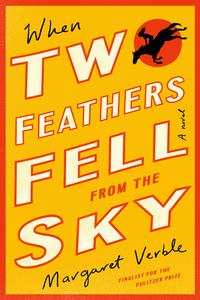
|
|
| photo: Greg Reynolds | |
Margaret Verble is an enrolled citizen of the Cherokee Nation of Oklahoma. Her first novel, Maud's Line, was a finalist for the Pulitzer Prize. Her second novel, Cherokee America, was selected by the New York Times as one of the 100 Notable Books of the Year for 2019. Her new book, When Two Feathers Fell from the Sky (Mariner, October 12, 2021), follows a death-defying young Cherokee horse-diver who, with her companions from the Glendale Park Zoo, must get to the bottom of a mystery that spans centuries. Verble lives in Lexington, Ky.
On your nightstand now:
I have to be disciplined about buying books because that's a habit that can get totally out of hand. I read reviews. Then I buy about 10 or 11 books at a time. As I go through them, I read more reviews and when I get down to two books, I buy another slew. At this moment, there are four novels beside my bed: The Vixen by Francine Prose, Great Circle by Maggie Shipstead, The Rib King by Ladee Hubbard and World Enough and Time by Robert Penn Warren. Three of those are current works that have gotten good press. The fourth is part of my commitment to read a few vintage novels a year.
Also in that stack are All that She Carried by Tiya Miles and The Ledger and the Chain by Joshua Rothman. As a Southerner, I like to continually educate myself from the African American perspective. A History of the Ozarks, Vol. 2, The Conflicted Ozarks by Brooks Blevins is also by my bed. I enjoy reading history, and three generations back some of my family had problems with an Ozark vigilante group called the Baldknobbers. Finally, The Case of the Murderous Dr. Cream by Dean Jobb is on my nightstand. It combines two of my favorite things, true crime and Victorian England.
Favorite book when you were a child:
My favorite books as a child were the Dr. Dolittle series. They were written between the 1920s and the 1950s, and some are considered racist now. But they actually instilled in me an interest in going to foreign counties and meeting different people.
Your top five authors:
I have a weakness for the Brits. I think Hilary Mantel is the most brilliant fiction writer of our time. I also like Ian McEwan for his range as well as his skill, and I like Sarah Waters for her ability to build suspense and write good, creepy historical fiction. On this side of the pond, I like Elizabeth Strout for her ability to make the lives of small-town Midwesterners feel as tragic as King Lear, and Flannery O'Connor for being flat-out the funniest and most philosophical of American writers.
Book you've faked reading:
Moby-Dick. I was a senior in college and I just didn't have time to read 700 pages about whale hunting. I've never regretted it. And I've never read it.
 Book you're an evangelist for:
Book you're an evangelist for:
The latest book I've been recommending is Charles Hudson's Knights of Spain, Warriors of the Sun: Hernando de Soto and the South's Ancient Chiefdoms. It's both engrossing and educational. Very few people know this history, and the book is brilliantly researched and written.
Book you've bought for the cover:
I think some covers are a lot better than others, but I can't say that I've ever bought a book for its cover.
Book you hid from your parents:
The Carpetbaggers by Harold Robbins. I think I was reading it for the sex and my father thought so, too. He asked me not to finish it, so I had to hide to do that.
Book that changed your life:
The Portable Jung. It's a collection of C.J. Jung's most important work edited by Joseph Campbell. I came across it when it was 25 and it changed the way I looked at the world. After reading it, I read everything of Jung's I could get my hands on. I still think he had deep insight into the nature of the human mind and our connection to one another.
Favorite line from a book:
On the page this will look like a misprint, but it's written in dialect. From Flannery O'Connor's "A Good Man Is Hard to Find":
"She would of been a good woman," The Misfit said, "if it had been somebody there to shoot her every minute of her life."
The sentence is at the end of a powerful and awful (the truest sense of the word) story. Every time I read it, I want to laugh out loud. And then I want to slap myself for being so wicked.
Five books you'll never part with:
She's just my favorite American author. So damn funny. So wise about human nature.
History of the Cherokee Indians by Emmet Starr. This has been an invaluable resource for me as a writer and amateur historian. It's an essential primary source for all Cherokees.
20 Cases Suggestive of Reincarnation by Ian Stevenson, M.D. I became interested in reincarnation decades ago, but most books on that subject lack substance and rigor. Stevenson was at the University of Virginia School of Medicine for about 50 years. He did serious--and convincing--work.
Eleanor and Franklin by Joseph Lash. I'm a great admirer of Eleanor Roosevelt. This book started me down that path.
The Righteous Mind: Why Good People are Divided by Politics and Religion by Jonathan Haidt. A lot of my doctoral work was in philosophy, and I've retained an interest in all branches of it, but especially in ethics.
Book you most want to read again for the first time:
Anything by Flannery O'Connor.

